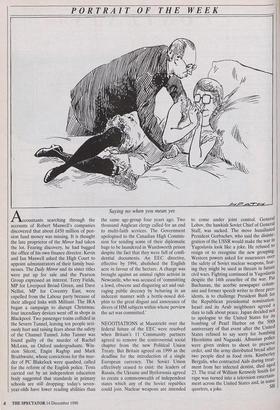PORTRAIT OF THE WEEK
Saying no when you mean yes Accountants searching through the accounts of Robert Maxwell's companies discovered that about £450 million of pen- sion fund money was missing. It is thought the late proprietor of the Mirror had taken the lot. Fearing discovery, he had bugged the office of his own finance director. Kevin and Ian Maxwell asked the High Court to appoint administrators of their family busi- nesses. The Daily Mirror and its sister titles were put up for sale and the Pearson Group expressed an interest. Terry Fields, MP for Liverpool Broad Green, and Dave Nellist, MP for Coventry East, were expelled from the Labour party because of their alleged links with Militant. The IRA began a campaign to disrupt Christmas: four incendiary devices went off in shops in Blackpool. Two passenger trains collided in the Severn Tunnel, leaving ten people seri- ously hurt and raising fears about the safety of the Channel Tunnel. John Tanner was found guilty of the murder of Rachel McLean, an Oxford undergraduate. Win- ston Silcott, Engin Raghip and Mark Braithwaite, whose convictions for the mur- der of PC Blakelock were quashed, called for the reform of the English police. Tests carried out by an independent education body suggested that standards in primary schools are still dropping: today's seven- year-olds have lower reading abilities than
the same age-group four years ago. Two thousand Anglican clergy called for an end to multi-faith services. The Government apologised to the Canadian High Commis- sion for sending some of their diplomatic bags to be laundered in Wandsworth prison despite the fact that they were full of confi- dential documents. An EEC directive, effective by 1994, abolished the English acre in favour of the hectare. A charge was brought against an animal rights activist in Newcastle, who was accused of 'committing a lewd, obscene and disgusting act and out- raging public decency by behaving in an indecent manner with a bottle-nosed dol- phin to the great disgust and annoyance of divers of HM subjects within whose perview the act was committed.'
NEGOTIATIONS at Maastricht over the federal future of the EEC were resolved when Britain's 11 Community partners agreed to remove the controversial social chapter from the new Political Union Treaty. But Britain agreed on 1999 as the deadline for the introduction of a single European currency. The Soviet Union effectively ceased to exist: the leaders of Russia, the Ukraine and Byelorussia agreed to create a commonwealth of independent states which any of the Soviet republics could join. Nuclear weapons are intended
to come under joint control. General Lobov, the hawkish Soviet Chief of General Staff, was sacked. The move humiliated President Gorbachev, who said the disinte- gration of the USSR would make the war in Yugoslavia look like a joke. He refused to resign or to recognise the new grouping. Western powers asked for assurances over the safety of Soviet nuclear weapons, fear- ing they might be used as threats in future civil wars. Fighting continued in Yugoslavia despite the 14th ceasefire of the war. Pat Buchanan, the acerbic newspaper colum- nist and former speech writer to three pres- idents, is to challenge President Bush for the Republican presidential nomination. Israel and its Arab neighbours agreed a date to talk about peace. Japan decided not to apologise to the United States for its bombing of Pearl Harbor on the 50th anniversary of that event after the United States refused to say sorry for bombing Hiroshima and Nagasaki. Albanian police were given orders to shoot to preserve order, and the army distributed bread after two people died in food riots. Kimberley Bergalis, who contracted Aids during treat- ment from her infected dentist, died aged 23. The trial of William Kennedy Smith for rape was turned into a television entertain- ment across the United States and, in some


































































 Previous page
Previous page